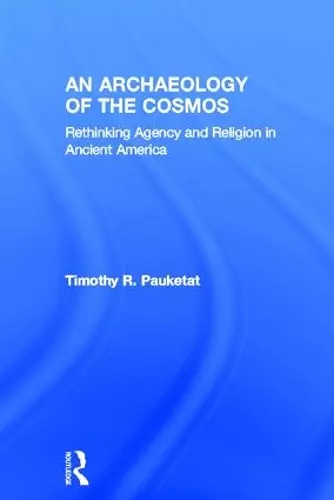An Archaeology of the Cosmos
Rethinking Agency and Religion in Ancient America
Format:Hardback
Publisher:Taylor & Francis Ltd
Published:22nd Oct '12
Currently unavailable, and unfortunately no date known when it will be back
This hardback is available in another edition too:
- Paperback£44.99(9780415521291)

An Archaeology of the Cosmos seeks answers to two fundamental questions of humanity and human history. The first question concerns that which some use as a defining element of humanity: religious beliefs. Why do so many people believe in supreme beings and holy spirits? The second question concerns changes in those beliefs. What causes beliefs to change?
Using archaeological evidence gathered from ancient America, especially case material from the Great Plains and the pre-Columbian American Indian city of Cahokia, Timothy Pauketat explores the logical consequences of these two fundamental questions. Religious beliefs are not more resilient than other aspects of culture and society, and people are not the only causes of historical change.
An Archaeology of the Cosmos examines the intimate association of agency and religion by studying how relationships between people, places, and things were bundled together and positioned in ways that constituted the fields of human experience. This rethinking theories of agency and religion provides readers with challenging and thought provoking conclusions that will lead them to reassess the way they approach the past.
"This brilliant original work explores the role of religion as an agent of cultural change...The book is primarily for US archaeologists and anthropologists, but really for any scholar interested in theories of cultural change. Summing Up: Highly recommended."
– P. J. O'Brien, emerita, Kansas State University, CHOICE
"Archaeology of the Cosmos asks a big question: "what is the relationship between religion and historical change?" and proceeds to frame it through the ambitious and difficult lens of cosmology as understood, experienced, and materialized by prehistoric populations of North America and particularly of Cahokia. In search for answers to the big question, Timothy Pauketat retrieves religion from the trappings of symbolism and structuralism and places it where it belongs: in the movements and actions of practitioners. But this book is much more than a study of religion, of Cahokia’s processual history, or of archaeoastronomy. Archaeology of the Cosmos is a challenge to the comforts of rationalist thinking in American archaeology."
– María Nieves Zedeño, University of Arizona, USA
"This book is not only a major contribution to social theory in archaeology but also a masterful, innovative account of the rise of Cahokia and the Mississippian cultures of North America. Often theory and practice fail to integrate in archaeological case studies but this is a triumph in its originality, empirical observations and intellectual horizons. Pauketat is one of the most exciting up-and-coming archaeologists in North America. He deserves to be widely read by researchers and students of archaeology, cultural astronomy, religion and native American history around the world for his insights into the nature of religious belief, astronomy and social change... Pauketat charts new territory in his approach to understanding human agency and relationships between people, places and things. He has successfully shifted the debate in archaeological theory to a new level of sophistication and understanding. This is an excellent book which should have a profound impact on the discipline of archaeology."
- Mike Parker Pearson, University College London, UK
"Everything Pauketat writes makes you think. In this engaging and deeply insightful work, he compels us to consider the nexus of religion with human and other agents and the cosmos in shaping Cahokian lifeways and history. This is a bold, original work that greatly refines archaeological understandings of religion."
- Wendy Ashmore, University of California, Riverside, USA
"This is an innovative book that deserves to be read. It would appear to be the product of many years of primary field research and thought about the material and concepts presented, and Pauketat is to be congratulated for tackling issues of religions and beliefs from an archaeological perspective."
-Timothy Insoll, University of Manchester, UK
"I recommend this book for anyone interested in understanding ancient religion, landscape, architecture, or astronomy, anywhere in the world. It opens intriguing possibilities for future contributions not addressed here, such as manipulation of altered states of consciousness that shape perception, memory, and sensory experience, and consideration of specific kinds and scales of human relationships— hierarchies, heterarchies, kin groups, and ritual sodalities."
- Kelley Hays-Gilpin, Northern Arizona University, USA
"The great strength of this volume is Pauketat’s theoretical interpretative approach. He demonstrates the utility of defining religion as “ritualized venerations of mystical cosmic powers” (p. 2), as opposed to reducing it to a mental map of orthodoxies and boundaries. Pauketat is explicit that it is not possible to reconstruct prehistoric religious belief systems in any complete way. Nonetheless, through the use of well-documented examples, he convincingly demonstrates the role that naked-eye astronomy can play in networks of entities with agency to create historical actions. He also provides explicit examples of how and why cultural astronomy references may be performative rather than simply predic-tive. Pauketat provides a useful theoretical approach to integrate archaeoastronomy evidence into broader archaeological data sets. This volume is well worth reading."
-Andrew M. Munro, University of Oklahoma, USA, Journal of Skyscape Archaeology
ISBN: 9780415521284
Dimensions: unknown
Weight: 630g
256 pages